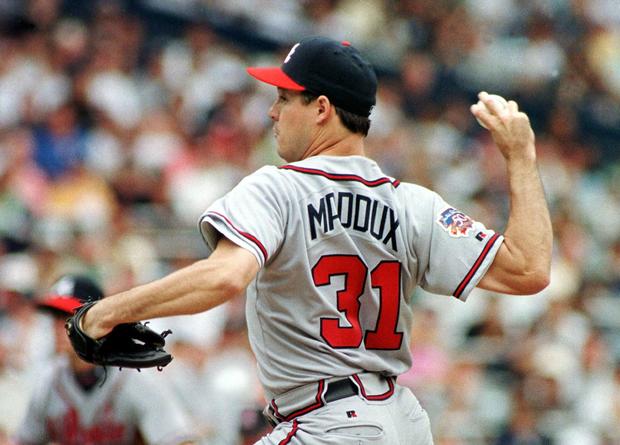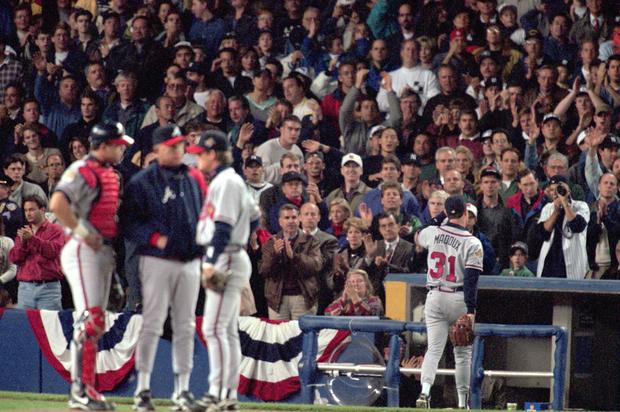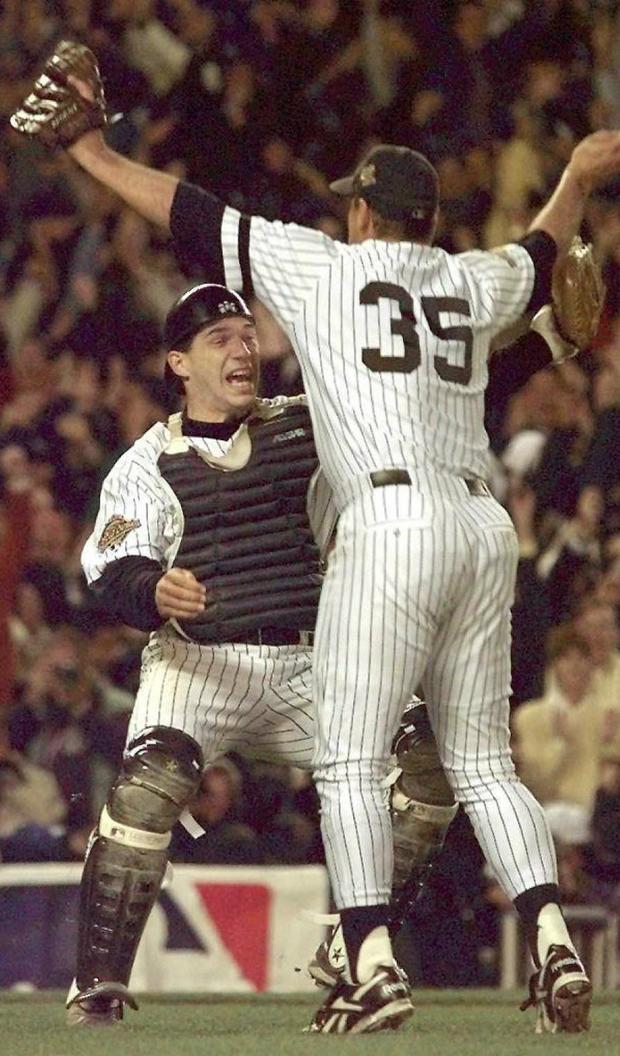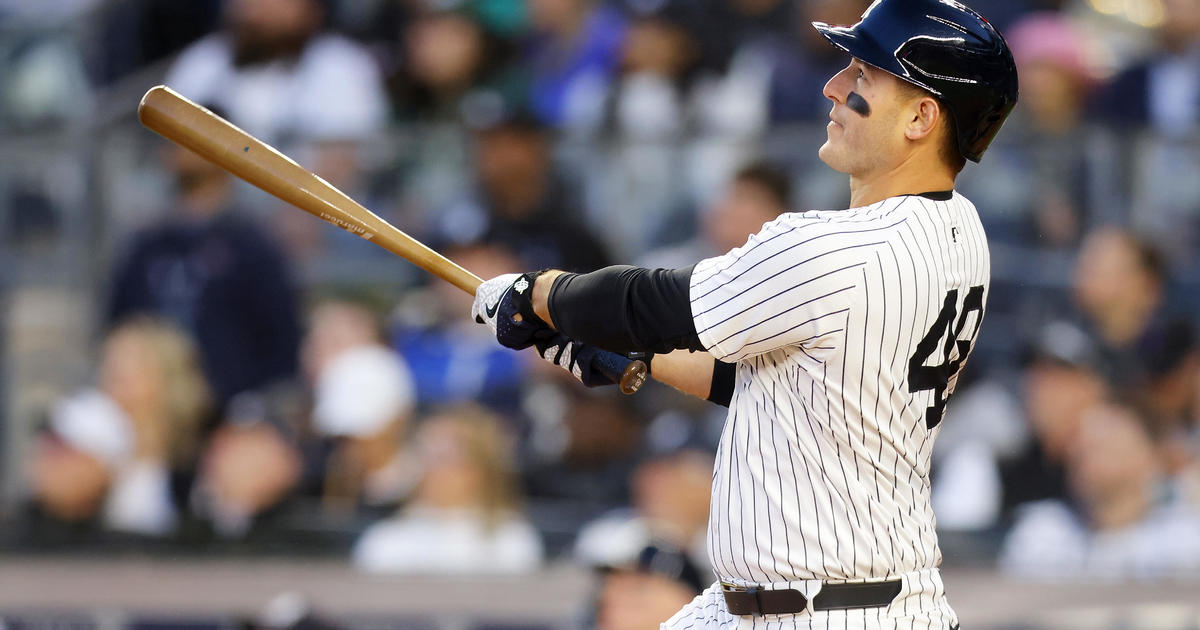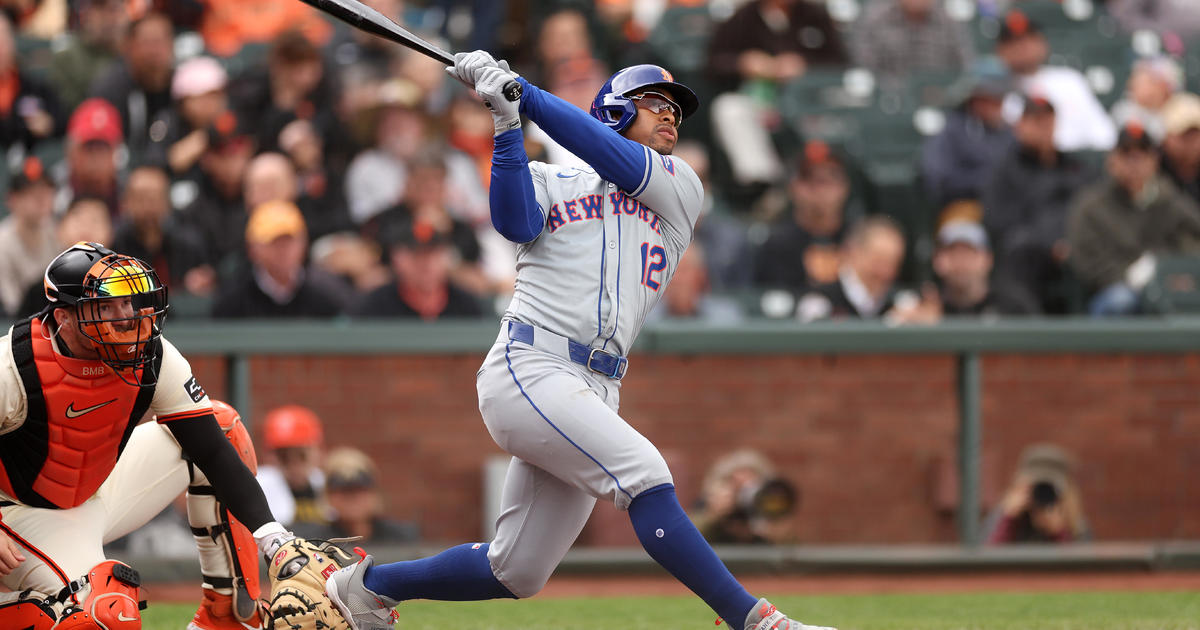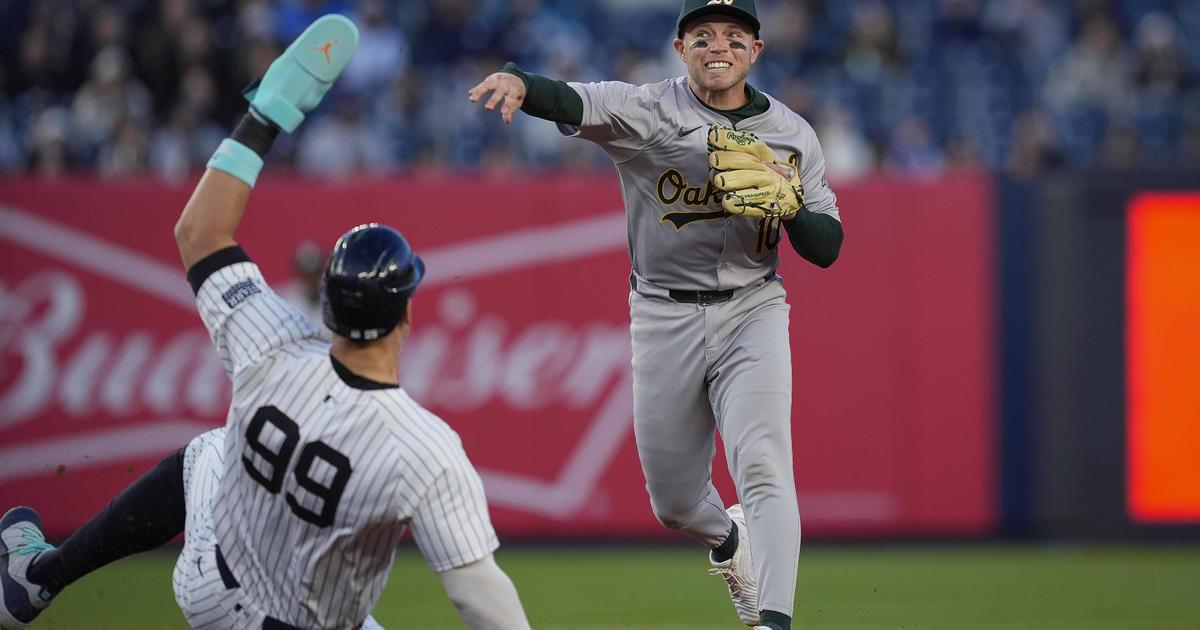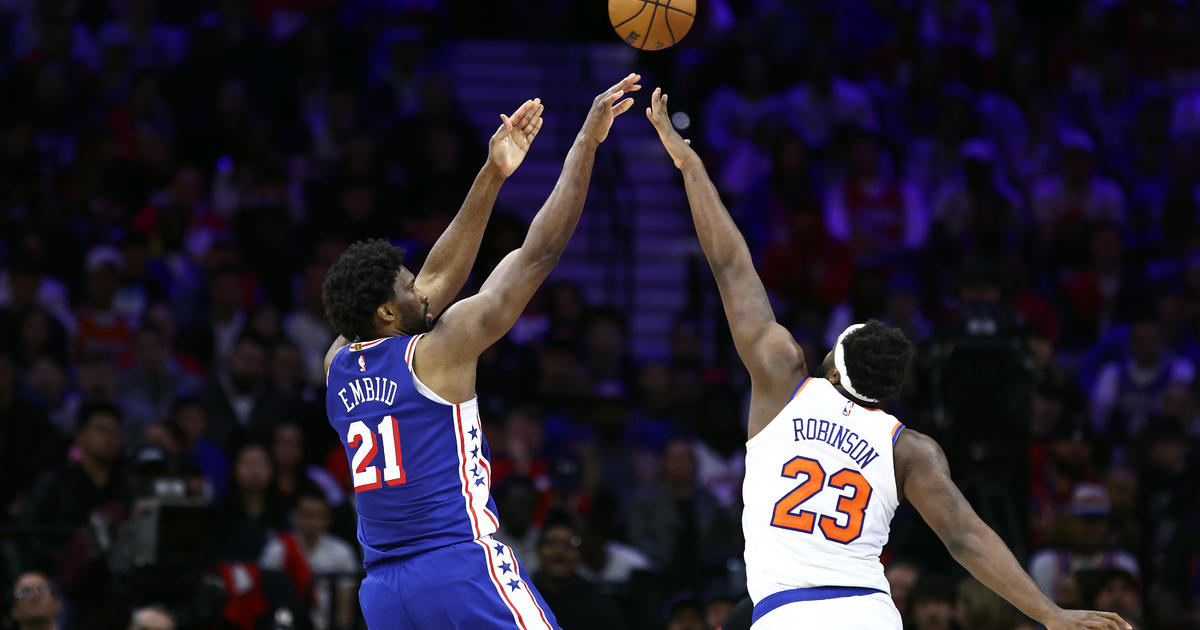Remembering The 1996 Yankees: Girardi Got The Best Of Buddy Maddux
By Sweeny Murti
» More Columns
"That's the one moment of time in my career I wish I could go back to."
The biggest hit of Joe Girardi's career happened in such a flash that he barely remembers anything about it. Oh sure, he remembers swinging at Greg Maddux's first pitch and hitting it. And he remembers standing on third base after driving in the first run of Game 6 of the 1996 World Series.
But the actual moment -- the feel of the stadium and the ground below it shaking like it had been struck by a meteor -- is lost now to Girardi, who can only wish to get it back through a time-travel fantasy.
Girardi did not begin the 1996 season on good terms with Yankees fans. He was replacing catcher Mike Stanley, who was an All-Star on the 1995 team that went to the playoffs.
Stanley hit .305 with 26 home runs and 84 RBI in 1993, and he combined for 35 homers and 140 RBI during the strike-shortened '94 and '95 seasons.
Three weeks into the '96 season, Girardi -- a career .269 hitter with 18 home runs -- was batting just .228 with 2 RBI.
Remembering that he wasn't -- and shouldn't try to become -- the power hitter Stanley was, Girardi settled into his season and batted .304 after May 1. For the season he batted .294 and did a lot of little things to help the Yankees offensively. Girardi led the team with 11 sacrifice bunts, and his 13 stolen bases were third behind Bernie Williams and Derek Jeter.
But as the Yankees rolled through the postseason, and moved to within a game of clinching the world championship, Girardi had yet to make a significant offensive contribution. He had only five hits in 28 at-bats and had not driven in a single run. At that point, the biggest hit by any Yankee in the Series was by the other catcher on the team. Jim Leyritz took over for Girardi late in Game 4 and blasted a three-run home run that erased the last lead the Braves would have in that World Series.
MORE: Remembering The 1996 Yankees: Leyritz's Series Blast Still Resonates
That home run swung momentum over to the Yankees. They erased a 2-0 deficit in the series by improbably winning three straight games in Atlanta. The Yanks came back home needing just one win to clinch their 23rd World Series title, but their first in 18 years. Game 6 wasn't going to be easy because they were facing Maddux, who was arguably the best pitcher in baseball and dominated the Yankees in a 4-0 victory in Game 2.
Seeing Maddux pitch at Yankee Stadium in the World Series is exactly what the Yankees and their fans were hoping for when he became a free agent after the 1992 season. They just thought it would be for the Yankees, not the Braves.
Then-Yankees general manager Gene Michael made a big push for Maddux. Michael was Maddux's first manager when the righty broke into the majors with the Cubs in 1986. Maddux entered free agency at age 26. As a Cy Young Award winner and the best pitcher on the market, he was an easy target for the Yankees as they began to rebuild themselves into contenders.
Maddux was looking for a five-year contract with a championship-caliber team, preferably in the National League. While he was open to listening to the Yankees, Maddux told Michael early in the process that it wasn't necessarily going to be the highest bidder that won his services.
After showing Maddux and his wife all that New York had to offer -- restaurants, a Broadway show, and suburban golf courses -- during a two-day trip, the Yankees had prepared a contract for $34 million over five years. It would make Maddux the highest paid pitcher in the game.
"I didn't think I had a chance to stay in the National League when I made that little trip to New York," Maddux said recently. "I thought nothing was going to happen with the Cubs or the Braves when I had made that trip. Things change in free agency. And actually it was on my return flight home from New York to Vegas when the Braves jumped in the picture again. The Braves were my first choice all along."
When Michael found out Maddux had chosen the Braves offer -- which was for $6 million less than the Yankees' proposal -- he made a frantic phone call to Maddux to get him to change his mind.
"I felt bad because I felt like I was going to New York (on the earlier trip) to sign a contract," Maddux said, though he left for home without being fitted for pinstripes.
As Michael made his last-ditch plea, Maddux asked, "You wouldn't want me to go back on my word now, would you?"
"Yes, I would!" Michael pleaded, which draws chuckles from both men over two decades later.
Maddux obviously kept his word and signed with the Braves, and won three more Cy Young awards in his first three seasons and a 1995 World Series ring. His victory in Game 2 of the 1996 Series put the Braves within two games of winning back-to-back championships.
"We loved our position," Maddux said. "We obviously didn't think the World Series was over by any means, but to win the first two and play the next three in Atlanta ... we felt really good about our position right there. And then, obviously, things changed."
By winning three straight and coming back to New York with a chance to clinch the World Series, the Yankees had whipped their fans into a frenzy. And they were ready to exert their influence on Maddux even before the first pitch was thrown.
"They were very creative with their ragging while (I was) warming up (in the bullpen)," Maddux said. "They did their homework. They found out what my wife's name was and they called her by her first name and threw her under the bus, too," Maddux laughed as he recalled.
Rather than come unglued, Maddux went about his business and actually seemed to enjoy the hostile environment.
"It's what makes it great," Maddux said.
"Some of the stuff they said was pretty good. You sit there and you chuckle as you're getting loose for the game. You just kind of enjoy it and embrace it. I appreciated their creativity and the negative stuff they were saying about me and my family."
More amused than he was rattled, Maddux set down the first six Yankees in a row on 25 pitches. Jimmy Key, the Yankees Game 6 starter, who signed with the team as a free agent the day after Maddux signed with the Braves in December 1992, matched the Atlanta ace with three scoreless innings.
Paul O'Neill led off the bottom of the third with a double down the right-field line, and moved to third on Mariano Duncan's groundout to the right side.
That brought up Girardi, who also broke into the majors with the Cubs and was Maddux's teammate and battery-mate for four years.
"We had a good relationship," Maddux said of his former catcher. "We also hung out off the field as well. We spent a lot of time in the hotel room. We played video games together."
Maddux, known as "Mad Dog," along with teammates Girardi, Mike Harkey and Damon Berryhill, would return to the hotel after road games and play 2-on-2 Sega Genesis volleyball until the wee hours of the morning. The games got so loud and so intense that sometimes hotel security got involved.
"Mad Dog was as competitive in that as he was in anything," Girardi said. "He was hard to beat."
He wasn't the only one.
"Joe and Mad Dog were the two most competitive people I ever played with," said Harkey, now Girardi's bullpen coach with the Yankees. "It didn't matter what it was, they wanted to win."
"Legendary," Girardi said in describing those video game marathons.
Now, imagine these two competitors going toe-to-toe in the World Series.
Girardi faced Maddux three times in Game 2, going 0-for-3 without ever getting the ball out of the infield. He stood in for his first at-bat of Game 6 with O'Neill standing on third base and one out.
Girardi looked down at third base coach Willie Randolph expecting a bunt sign. The safety squeeze was a play he had executed often during the season. But Girardi was surprised to see Joe Torre and his bench coach, Don Zimmer, weren't trying it in this spot. Maddux said he was a little taken aback by what he saw as well.
"I remember I was surprised the infield was in in the third inning," Maddux said.
It didn't make sense to him because he would rather get an out on a ground ball and avoid the big inning. He said he would not have been worried about a one-run deficit so early in the contest.
"I remember thinking 'get Joe out, give up one run, it's no big deal. Trade the run for the out,'" Maddux said.
Maddux felt he probably couldn't throw a fastball inside now, because it might have resulted in a bloop single over the drawn-in infield, but it wasn't a major issue. He still had the weapons to get his old friend out.
Girardi, ready to swing away instead of bunting, was now focused on getting one good swing.
"I'm really aware of how good his control is and you can't get behind (in the count)," Girardi said. "If you get one pitch to hit, you better hit it."
A pitcher like Maddux wasn't going to make too many mistakes.
"I knew that his location was impeccable," Girardi said. "I was going to be aggressive like I always was and look for something up."
Aggressive in this case meant swinging at the first pitch.
"I left the ball up a little bit," Maddux said. "And I think with the infield being in, he went from trying to hit the ball up the middle to trying to hit the ball in the air somewhere."
The problem on the play wasn't that the infield was in, but that center fielder Marquis Grissom, a four-time Gold Glove winner, was playing particularly shallow, and shaded toward right field.
Girardi sent a shot over Grissom's head. The ball landed on the warning track and bounced against the fence.
"I hit it and I thought I got a sac fly," Girardi said. "And then I saw it go over his head. I was just running as fast as I could."
As Girardi raced around the bases, O'Neill easily jogged home from third to give the Yankees a 1-0 lead.
"When I actually stepped on home plate, when I scored, I could actually feel the ground shaking," O'Neill said.
Girardi steamed past second base and the crowd noise kicked up another notch. He slid into third without a throw, popped up and stood on the bag with a triple.
"I just remember thanking God when I got to third base," Girardi said. "As a kid you dream about those opportunities, but most kids don't get a chance to actually play it out."
Girardi wasn't on third base for long. He scored on Jeter's RBI single to make it 2-0, and the old Stadium got even louder.
FOX analyst Tim McCarver calmly said to his partners Joe Buck and Bob Brenly, "Guys, our booth is shaking."
To which Brenly replied, "I think the whole city is shaking."
Williams later singled home Jeter and the Yankees led 3-0. The Yankees would get only four more hits the rest of the game and didn't score again, but they didn't have to because the countdown of outs was now on.
MORE: Remembering The 1996 Yankees: Wetteland Did A Lot In A Short Time
Key allowed only one run before coming out in the sixth inning. John Wetteland gave up a run in the ninth to make it 3-2 and had the tying run at second base when Mark Lemke popped up into foul territory behind third base. Charlie Hayes caught it for the final out. The Yankees were World Series champions.
MORE: Remembering The 1996 Yankees: Second Time Was The Charm For Hayes
Of the 1,100 hits Girardi piled up during his 15-year playing career, the triple stands out as the only one fans really remember or talk about. It wasn't the winning hit in the ninth inning, but it was the first lead the Yankees had in their own building in that World Series.
When someone brings it up, Girardi tends to get a little foggy on more vivid details about the actual moment.
"It's a blur," Girardi said. "I wish I could have soaked it in more because it happened so fast. I hear Paul O'Neill talk about how the stands were shaking. I don't remember any of that."
There are constant reminders on the scoreboard at Yankee Stadium, and, of course, it's only a click away on YouTube 20 years after the fact. But Girardi doesn't get caught up in seeing it over and over again.
"I really have not gone back and watched it a lot," Girardi said. "As you get further removed from it you don't think about going back to watch it."
Girardi has more vivid memories of waking up in his hotel room in White Plains the next morning and taking a walk with his dad to gather up all the newspapers that documented the Yankees as champions.
He also tends to put that triple behind other moments in the Series.
"I look at the big hit as Jim Leyritz's home run (in Game 4)," Girardi said. "That's the biggest hit of that World Series."
And when people ask about his memories of old Yankee Stadium, Girardi tends to bring up Hayes catching the final out of the Series and touching off the celebration at the pitcher's mound before he brings up his lid-lifting triple off the best pitcher in baseball at the time.
MORE: Remembering The 1996 Yankees: Torre's Team Had The Town All To Itself
Despite losing the series, Maddux counts pitching in Yankee Stadium for the first time in that World Series among his career highlights.
"Obviously you want to win, but just having the opportunity to go out there and pitch in a game like that is pretty cool," said Maddux, who never won another World Series game, but took his 355 career victories to the Hall of Fame.
The hysteria in the stands at that exact moment when Girardi connected off Maddux was lost on both men.
"I heard nothing," Girardi said. "It happened so fast, and I think I was so excited that I didn't soak any of it in. I think that's just your focus. You get so locked into what you're doing that you don't notice your surroundings."
Maddux had learned to tune out crowd out noise long ago, not being affected since Mets fans turned the Shea Stadium volume up as they clinched the NL East against his Cubs in 1986.
"Ever since then it really hadn't been an issue for me," Maddux said. "You really don't hear it."
And that is the most amazing part about that moment. There were over 56,000 people in the building on the night of Oct. 26, 1996. And the only two people who didn't hear or feel the seismic event that occurred on that triple were the guy who threw the pitch and the guy who hit it.
For more coverage of the 1996 Yankees celebration, please click here.
Please follow Sweeny on Twitter at @YankeesWFAN
